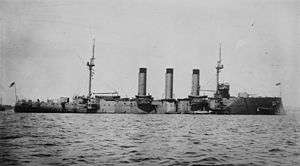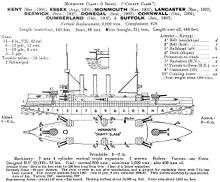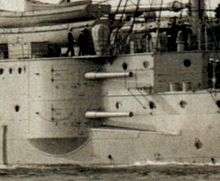Monmouth-class cruiser
 HMS Suffolk | |
| Class overview | |
|---|---|
| Name: | Monmouth |
| Operators: |
|
| Preceded by: | Drake class |
| Succeeded by: | Devonshire class |
| In commission: | 1903–1921 |
| Completed: | 10 |
| Lost: | 2 |
| Scrapped: | 8 |
| General characteristics | |
| Type: | Armoured cruiser |
| Displacement: | 9,800 long tons (10,000 t) (normal) |
| Length: | 463 ft 6 in (141.3 m) (o/a) |
| Beam: | 66 ft (20.1 m) |
| Draught: | 25 ft (7.6 m) |
| Installed power: |
|
| Propulsion: |
|
| Speed: | 23 knots (43 km/h; 26 mph) |
| Complement: | 678 |
| Armament: |
|
| Armour: | |
The Monmouth class was a ten-ship class of 10,000 ton armoured cruisers built around 1901 to 1903 for the Royal Navy and designed specifically for commerce protection. The ships were also referred to as County-class cruisers as they carried the names of British counties.
Design


Expected only to fight light cruisers and armed merchant ships, the class was armed with fourteen 6-inch guns at a time when most British armoured cruisers also carried at least a pair of 9.2-inch guns: Four of the guns were mounted in two twin turrets at a good height, the remaining ten were installed in hull-mounted casemates, five on each side. The lower casemate guns were just a few feet above water, making them impossible to use in heavy seas. Sir John Fisher commented that "Sir William White designed the County class but forgot the guns."[1] On the other hand, they were relatively fast ships for their time.
Building programme
The following table gives the build details and purchase cost of the members of the Monmouth class. Standard British practice at that time was for these costs to exclude armament and stores. The compilers of The Naval Annual revised costs quoted for British ships between the 1905 and 1906 editions. The reasons for the differences are unclear.[2]
| Ship | Builder | Engine Maker |
Date of | Cost according to | |||
|---|---|---|---|---|---|---|---|
| Laid Down | Launch | Completion | (BNA 1905)[3] | (BNA 1906)[4] | |||
| Monmouth | London and Glasgow Shipping Company | London & Glasgow Shipping Company |
29 Aug 1899 | 13 Nov 1901 | 2 Dec 1903 | £709,085 | £979,591 |
| Bedford | Fairfield, Govan | Fairfield | 19 Feb 1900 | 31 Aug 1901 | 11 Nov 1903 | £734,330 | £706,020 |
| Essex | Pembroke Dockyard | J Brown | 1 Jan 1900 | 29 Aug 1901 | 22 Mar 1903 | £770,325 | £736,557 |
| Kent | Portsmouth Dockyard | Hawthorn | 12 Feb 1900 | 6 Mar 1901 | 1 Oct 1903 | £733,940 | £700,283 |
| Berwick | W. Beardmore & Company |
Humphrys | 19 Apr 1901 | 20 Sep 1902 | 9 Dec 1903 | £776,868 | £750,984 |
| Cornwall | Pembroke Dockyard | Hawthorne | 11 Mar 1901 | 29 Oct 1902 | 1 Dec 1904 | £789,421 | £756,274 |
| Cumberland | London & Glasgow Shipping Company, Glasgow |
London & Glasgow Shipping Company |
19 Feb 1901 | 16 Dec 1902 | 1 Dec 1904 | £751,508 | £718,168 |
| Donegal | Fairfield, Govan | Fairfield | 14 Feb 1901 | 4 Sep 1902 | 5 Nov 1903 | £752,964 | £715,947 |
| Lancaster | Armstrongs, Elswick | Hawthorn | 4 Mar 1901 | 22 Mar 1903 | 5 Apr 1904 | £763,084 | £732,858 |
| Suffolk | Portsmouth Dockyard | Humphrys | 25 Mar 1901 | 15 Jan 1903 | 21 May 1904 | £783,054 | £722,681 |
Service
Upon completion, the ships served briefly in home waters before being assigned to various oversea stations (China, Halifax, and the Caribbean). During this time HMS Bedford was wrecked in the East China Sea and scrapped.
Following the outbreak of WW1, the ships were primarily tasked with combatting German commerce raiders, patrolling in both the North and South Atlantic. HMS Monmouth was assigned to Admiral Craddock's squadron, and was sunk at the Battle of Coronel. HMS Kent was also assigned to Craddock's squadron, but failed to join in time; she remained at the Falklands and joined Admiral Sturdee's squadron, which also included HMS Cornwall. In the ensueing Battle of the Falklands, HMS Kent pursued and sank Nürnberg, while HMS Cornwall pursued and sank Leipzig. HMS Kent continued the pursuit of Dresden, eventually locating her and forcing her to be scuttled at the Battle of Más a Tierra. Later HMS Cornwall participated in the blockade of Königsberg in the Rufiji river.
After the war, several of the ships served briefly as training ships. All were withdrawn from service and scrapped in 1920-21.
Notes
- ↑ "Cwt" is the abbreviation for hundredweight, 12 cwt referring to the weight of the gun.
Footnotes
- ↑ Massie, Robert K. (2004). Castles of Steel. Balantine Books. ISBN 0-345-40878-0.
- ↑ The 1906 figure for Monmouth is particularly high. but is as quoted in the original. The 1914 edition also quotes £979,591 as the cost of Monmouth.
- ↑ Brassey's Naval Annual 1905, p234-243
- ↑ Brassey's Naval Annual 1906, p208-215
Bibliography
- Brassey, T.A. (ed)The Naval Annual 1905
- Chesneau, Roger & Kolesnik, Eugene M., eds. (1979). Conway's All the World's Fighting Ships 1860–1905. Greenwich: Conway Maritime Press. ISBN 0-8317-0302-4.
- Corbett, Julian. Naval Operations to the Battle of the Falklands. History of the Great War: Based on Official Documents. I (2nd, reprint of the 1938 ed.). London and Nashville, Tennessee: Imperial War Museum and Battery Press. ISBN 0-89839-256-X.
- Friedman, Norman (2012). British Cruisers of the Victorian Era. Barnsley, South Yorkshire, UK: Seaforth. ISBN 978-1-59114-068-9.
- Friedman, Norman (2011). Naval Weapons of World War One. Barnsley, South Yorkshire, UK: Seaforth. ISBN 978-1-84832-100-7.
- Leyland, J. and Brassey, T.A. (ed)The Naval Annual 1906
- Massie, Robert K. (2004). Castles of Steel: Britain, Germany, and the Winning of the Great War at Sea. London: Jonathan Cape. ISBN 0-224-04092-8.
- Silverstone, Paul H. (1984). Directory of the World's Capital Ships. New York: Hippocrene Books. ISBN 0-88254-979-0.
External links
| Wikimedia Commons has media related to Monmouth class cruiser. |
- The Dreadnought Project Technical details of the ships.